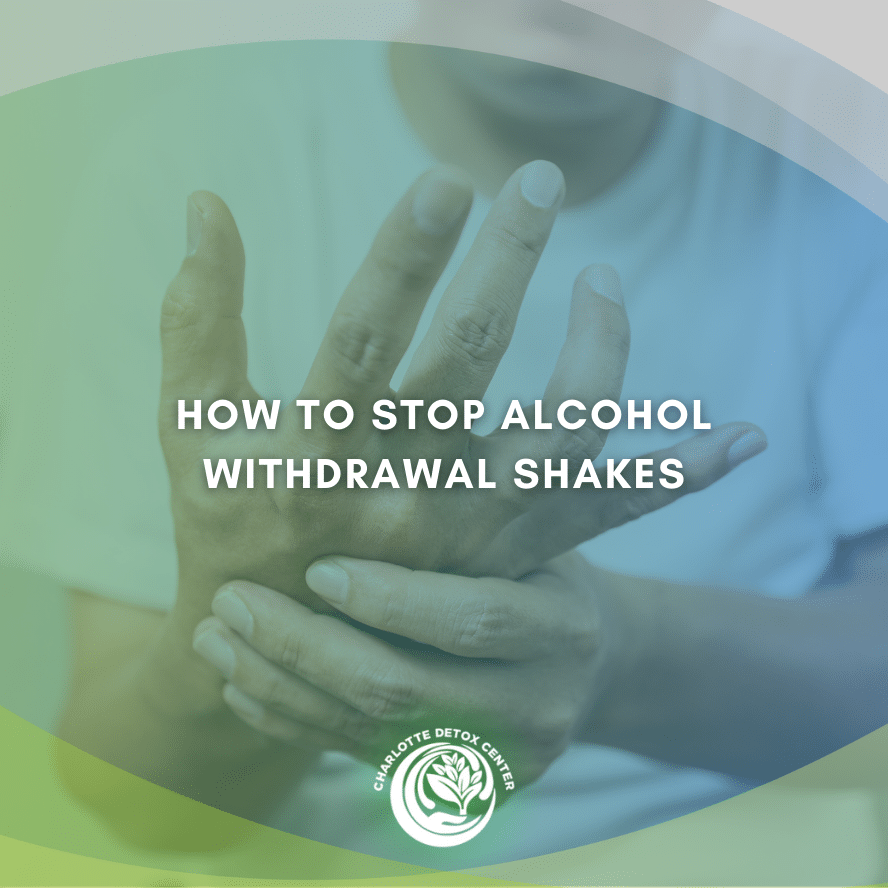How to Stop Alcohol Withdrawal Shakes

Medically Verified: 2/1/24
Medical Reviewer
Chief Editor

All of the information on this page has been reviewed and verified by a certified addiction professional.
Long-term alcohol abuse changes the brain and body in various ways. One way is by developing a physical dependence on alcohol. A physical dependence is marked by withdrawal symptoms that occur if you suddenly stop drinking. Unfortunately, alcohol withdrawal can be dangerous, and it can come with a host of unpleasant symptoms.
Uncontrollable shaking of the hands is a common sign of alcohol withdrawal.[1] For many people, it is one of the first symptoms they experience and a sign that worse symptoms are yet to come. The good news is there are many effective ways to stop alcohol withdrawal shakes.
What is Alcohol Withdrawal Shakes?
Tremors, also known as “the shakes,” are a common symptom of alcohol withdrawal that occurs in moderate to severe drinkers. The tremors are usually isolated to the hands, but they can occur anywhere in the body.[2]
The shakes occur when the body tries to adjust to not having alcohol in the system. Because alcohol is a central nervous system depressant, it slows down breathing, respiration, and heart rate. When you suddenly stop drinking, your body takes time to adjust, and your nerves become excited or overactive. This results in uncomfortable and sometimes dangerous symptoms of withdrawal including the shakes.
Alcohol withdrawal shakes can be scary, especially because seizures and severe tremors are possible during alcohol withdrawal. Fortunately, there are many ways you can cope with this symptom. And, these tremors will go away once you have detoxed completely.
5 Ways to Stop Alcohol Withdrawal Shakes
There are both natural and professional remedies that can help control your tremors. If you are planning to stop drinking, consider preparing some of these measures ahead of time to prevent tremors. Better yet, consider detoxing at a medical facility like Charlotte Detox Center where all of your symptoms can be managed at a professional level.
Here are 5 effective ways to prevent and stop the shakes.
1. Self-Care and Stress Management
Practicing basic self-care such as getting enough sleep, eating healthy, and getting light exercise can actually reduce your chances of experiencing the shakes. This is because lack of self-care can lead to stress and anxiety, both of which can make alcohol withdrawal tremors worse.
You should also implement some stress management techniques into your routine. Activities like yoga, meditation, deep breathing, journaling, and even arts and crafts can help calm your nerves and stop the shakes.
2. Stay Hydrated and Well-Nourished
When your body is hydrated and you are drinking plenty of water, your liver is able to metabolize any alcohol left in your system and flush toxins out of your body. However, when you are dehydrated, your withdrawal symptoms may get worse.[3] Be sure to keep hydrated when you stop drinking–even if you don’t think you are thirsty. This can help reduce and stop alcohol withdrawal shakes.
In addition to staying hydrated, be sure to eat a healthy, balanced diet. Try to eat a lot of fresh fruits, vegetables, and lean protein. Avoid fatty, sugary, or processed foods as these can make you feel worse. A balanced, nutritious diet during detox can even help alleviate stress and anxiety, further helping reduce your tremors.
3. Ask Your Doctor About Medications
If you are struggling with alcohol abuse and would like to quit, but don’t quite need detox or rehab, you can talk to your doctor about finding a safe and effective way to sober up.
Before you stop drinking, make an appointment with your doctor to talk about your drinking habits and overall health. Ask your doctor about detox medications like baclofen or benzodiazepines. Common benzodiazepine medications used to treat alcohol withdrawal and prevent tremors include diazepam (Valium), chlordiazepoxide (Librium), lorazepam (Ativan), and oxazepam (Serax).[3]
You can also talk to him or her about what withdrawal symptoms you can expect to see if you are at risk for the shakes in the first place.
Aside from medications, your doctor may be able to help you create a plan to slowly cut back your drinking so you avoid withdrawal altogether. He or she may also make personalized recommendations that can make your detox experience less painful.
However, if your doctor determines you will be safer doing a supervised detox, you may be referred to a local drug and alcohol detox facility.
4. Detox at an Inpatient Medical Facility
The best way to prevent or stop alcohol withdrawal shakes is to enlist the help of a drug and alcohol detox facility. During inpatient detox, doctors and nurses provide around-the-clock care, IV hydration, nutritional support, prescription medications, and therapeutic counseling services. This comprehensive medical and psychiatric care can help you detox safely and comfortably.
In the rare event that your tremors progress into something worse and far more dangerous, medical staff will be ready to intervene and provide life-saving care. Detoxing in a supervised medical facility is, by far, the safest way to endure alcohol withdrawal.
Stop Drinking at Our World-Class Alcohol Detox Center
Charlotte Detox Center bridges the gap between the luxury and comfort of your home with the safety and medical supervision of a hospital. Our exclusive, private facility in Charlotte, North Carolina is an ideal place to begin your journey of recovery. Our highly trained medical and clinical staff are able to manage your physical symptoms and discomfort while providing you with encouraging emotional support.
We make sure you stay safe while you detox so you can focus on what matters most–your personal recovery. Call now to speak with an admissions coordinator about getting started with our alcohol detox program.
References:
